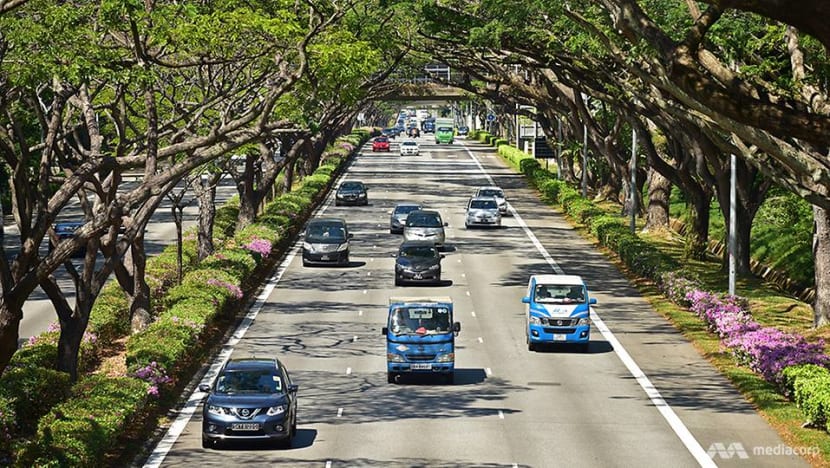COE prices set to persist around S$100,000, say analysts amid low supply and pent-up demand
While the latest premiums for cars may have declined slightly, they are unlikely to fall much further and may even increase soon, industry analysts say.

Cars on an expressway in Singapore. (File photo: CNA/Gaya Chandramohan)
SINGAPORE: Certificate of Entitlement (COE) prices are likely to remain high for a while longer as supply remains limited and demand is still strong, analysts said.
Despite the slight dip in premiums for cars in the latest bidding exercise, which closed on Thursday (May 4), it is too early to tell if prices have peaked, they added.
After breaking records for three consecutive cycles, Category A and B prices came in slightly lower at S$101,001 (US$76,000) and S$119,399 respectively.
In the previous tender that ended on Apr 19, premiums closed at S$103,721 for Category A and S$120,889 for Category B.
Category A is for smaller cars up to 1,600cc and 130bhp, and electric vehicles with up to 110 kilowatts of power. Category B is for larger, more powerful cars.
At the close of bidding on Thursday, COEs for commercial vehicles rose to S$75,589 from S$75,334, and open category prices were at S$124,002, S$499 lower than the previous round.
Motorcycle premiums fell sharply to S$5,002 from S$12,179 following new measures that include requiring bidders to pay a higher deposit.
STRUCTURAL ISSUES REMAIN
Analysts said the slightly lower COE premiums for cars remain within expectations, and could even go back up in the next few cycles.
"We don't consider (this) a drop," said Mr Raymond Tang, market analyst at Yong Lee Seng Motor.
For Category A, B and E, the drop in premiums ranged from a few hundred dollars to a few thousand dollars - a "very small percentage", noted Mr Tang.
Only a drop of perhaps S$15,000 would be considered "shocking", he added.
Mr Tang said he sees premiums for Category A and B hovering around the S$100,000 mark - with slight rises and dips - at least until the end of the year.
He pointed out that with the small number of COEs available per month, it is easy for demand to exceed supply.
There were 474 COEs available in Category A and 410 in Category B in this round. He compared it with other years where there may have been more than a thousand certificates per month.
"This is a cycle, you cannot force the supply to be increased," said Mr Tang. The supply of new COEs depends on the number of deregistrations, which is usually when the COE expires 10 years after registration.
In other words, the number of cars registered 10 years ago is linked to the number of cars being deregistered now, which in turn affects the number of COEs being issued.
Economist Walter Theseira, an associate professor at the Singapore University of Social Sciences, also said he does not expect a "significant change" in premiums for private cars.
"The underlying structural issue of low supply will remain for many months, and unless there are significant changes in demand, there will not be any large movement downwards," he told CNA.
Listen:
Demand is more difficult to predict because it depends on macroeconomic and business conditions, said Assoc Prof Theseira. But for now, it remains "extremely high", and many are still willing and able to pay.
For premium models, he said, the COE makes up much less than half the cost of the car.
"There is no shortage of premium car models on the road in Singapore. So for the luxury market in Singapore, there is more than enough willingness to absorb higher COE prices, in order to get their car now."
Associate Professor Raymond Ong, from the Department of Civil and Environmental Engineering at NUS, said: "There is still pent-up demand, judging from the bid versus the quota."
There were 189 more bids than the quota for Category A and 103 more in Category B.
The quota is unlikely to increase, he added.
REDUCING SPECULATION IN MOTORCYCLE COES
The large decline in COE premiums for motorcycles is a result of the new measures introduced by the Land Transport Authority (LTA), analysts said.
Bidders now have to put down a S$1,500 deposit, up from S$800.
Assoc Prof Ong described this as a "drastic change" in policy. "It (requires) a larger deposit, so they cannot anyhow bid."
The LTA also lowered the validity period of Category D temporary COEs from three months to one month.
Assoc Prof Theseira said the new measures have the effect of "greatly reducing the value of speculating".
He said dealers tend to buy and hold on to a significant stock of temporary motorcycle COEs, which they use to register motorcycles in their business' name when needed. They then sell the motorcycles to consumers as a "new second-hand" product because motorcycle COEs cannot be transferred.
The dealers profit when COE premiums rise, because they price the motorcycles based on current COE prices, even though they bought the certificates at a lower price.
"Hence, there is an incentive for motorcycle dealers with large COE stocks to attempt to control the COE market price," said Assoc Prof Theseira.
By increasing the bid deposit, it becomes more expensive to give up an unused COE. Reducing the temporary COE period to one month also makes it difficult for dealers to hold onto a certificate speculatively, he said.
"Because the motorcycle COE market operates differently, and is more driven by the actions of a smaller number of dealers ... there could be quite a bit of bumpiness as the motorcycle market tries to settle on a new equilibrium or a new business model for dealing with COEs," he said.

















